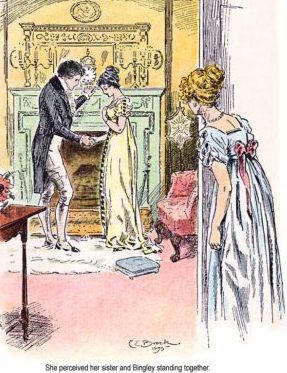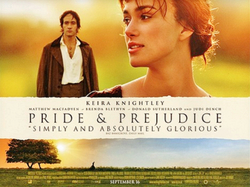The 2005 version of Pride & Prejudice surprised me greatly. Having been an ardent fan of the faithful BBC adaptation starring Jennifer Ehle and Colin Firth, I strongly believed that no other interpretations were required. I avoided watching Keria Knightley’s Miss Bennet for years until the movie showed up on my Netflix recommendation. And I am so glad I gave in.
As an adaptation, Debora Moggach’s screenplay remains truthful to the novel. Key turning points and interactions are verbatim from the book. In other places, extensions and improvisation of text add immense value to the original plot. For instance, Lizzy’s reaction to Charlotte’s engagement is more frank than the contained polite one in the book. The first exchange of dialogues between Lizzy and Mr. Darcy was more pointed and sharp, as perhaps Austen had intended, if, not so much written in words.
More than the screenplay, I believe Joe Wright brings out the darkness that lies repressed in the pages of the novel. The desperation of Bennet’s middle class is apparent in the sweaty fluttering of the mother running around an unkempt establishment. The girls are all pretty but are lacking in urban sophistication. The gap between them and the Bingleys/Darcys is painfully apparent. And had Mr. Bingley not always appeared a little dimwitted – so easily persuaded by his friend and sister to abandon his love. In the movie, there is no pretension. He is decidedly a simple, bumbling good-looking idiot.
There is some caricaturization of all main characters as if the layer of Victorian proprietary protecting them has been stripped away. The country dance halls are loud and noisy, the village streets muddy and the dresses of the Bennet girls not always starched clean.
The English countryside is used to its complete picturesque advantages with the camera often sweeping across meadows and hills. The weather is used to accentuate the mood of the storyline. I love that Darcy’s first proposal is in the rain instead of indoors in a cottage. The cloudy foggy day adds to the tormented exchange which again does the job of bringing out the undercurrents of passion only implicit in the novels. Lady Catherine De Bourg’s interview with Elizabeth in the middle of the night is outrageous and slightly improbable but, adds beautifully to the urgency leading to the ending.
As in the book and in the 1995 adaptation, Elizabeth of this version also goes through a change of heart when her eyes first fall on the grand facade of the Pemberly estate. Future financial security weighs big on the Bennet girls. It’s also interesting to note that a similar observation is made when Jane confesses her feelings for Mr. Bingley – “Handsome and conveniently rich”, Elizabeth quips to her sister.
When it comes to performances, Keira Knightley shines. It is truly her movie, and there isn’t much for anyone else to do. Macfayden’s Darcy is more wooden than repressed. I really did not see him as a ‘hero’. All the other big names in British cinema do well to bring the story together.
![]() I highly recommend watching this version. The tone of the movie might bother you a bit but this is a beautiful retelling of a classic with all the focus on the subtext.
I highly recommend watching this version. The tone of the movie might bother you a bit but this is a beautiful retelling of a classic with all the focus on the subtext.
For more movie reviews, go here.



